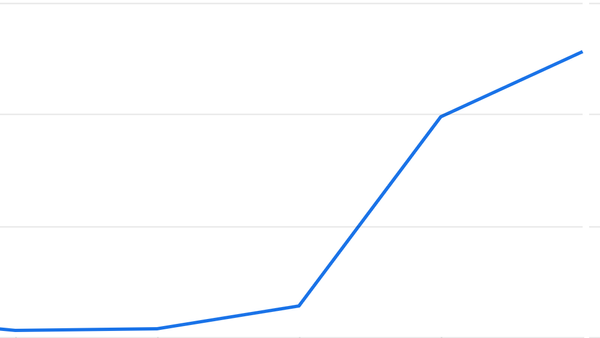Marketing Has Felt Really Hard Lately
On self-esteem, doubt, and dread.

I’ve been thinking of closing my business. Of running away, deleting my LinkedIn account and website, closing this newsletter, and never thinking about marketing again. I’ve looked at job applications, even started filling out cover letters.
Spoiler: I’m not going to close my business or run away, don’t worry.
It’s not because I want to. I love Kalyna. I adore my job. I have poured my soul into marketing. I truly couldn’t imagine myself being happier doing anything else.
Yet here I am. Looking at applications for jobs I don’t want, and sending my business coach messages like these:
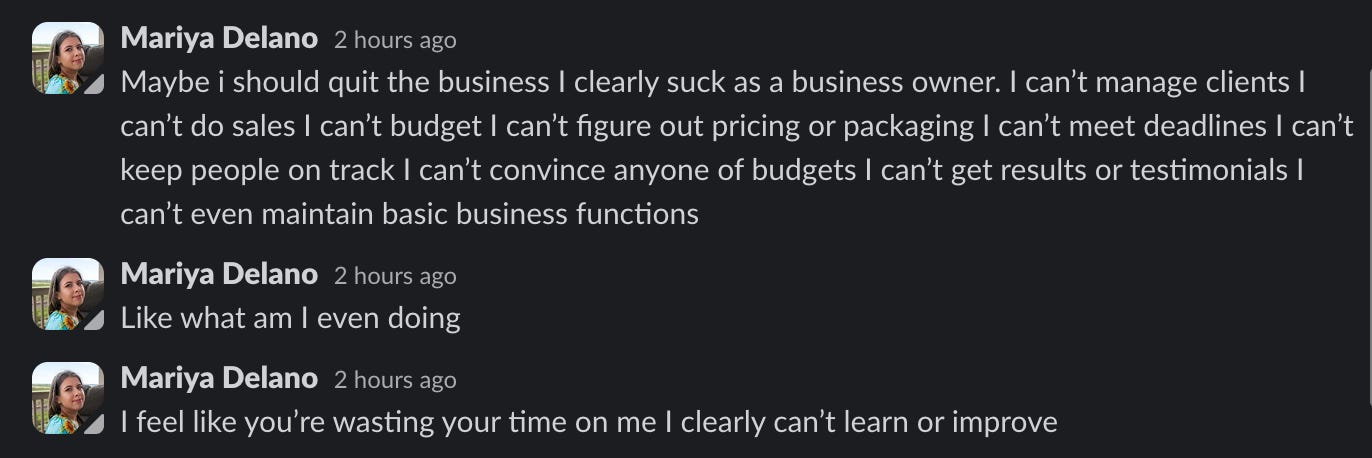
Thankfully, Heather knows me well enough not to believe me when I spiral. She is aware that I will likely go to bed in tears, wake up in the morning, and then start sending her excited updates about deliverables I submitted to clients or cool content ideas that suddenly popped into my head. And I probably will.
Then, at night, despair will claim me yet again. It’s so easy to feel hopeless. Working as a marketer, especially in B2B tech, has been so damn difficult this year.
What the Hell is Happening with Marketing These Days?
I don’t know about you, but I haven’t heard great things about the state of our field recently. Both in-house and freelance marketers are getting let go due to budget cuts, CFOs are demanding explanations, and executives refuse to understand marketing even as it hurts company growth.
Money’s gotten expensive thanks to The Fed hiking interest rates to a 5.25-5.50% range. Supposedly, this is to avoid inflation. I’m not an economist, but I have seen this belt-tightening make companies of all sizes get a lot more conservative with their spending. And when spend is limited… marketing is on the chopping block.
You’ve probably experienced this. If you’re in-house, you may have witnessed layoffs or increased scrutiny from financial stakeholders like your CFO, CRO, or CEO. If you’re a consultant or work in an agency, you may have seen deals fall through in the last moment and client work drying up.
It feels like nobody has money for marketing this year, and any budget they have goes into the most predictable and cookie-cutter tactics possible.
Companies are afraid of risk, so they get blinded with short-term decision making. Investments in brand, experimenting with new channels or tactics, outsourcing to high-quality contractors… all get dismissed as too unpredictable. Better pump more money into ads or something.
As Rand Fishkin sums up in this hilarious graphic:
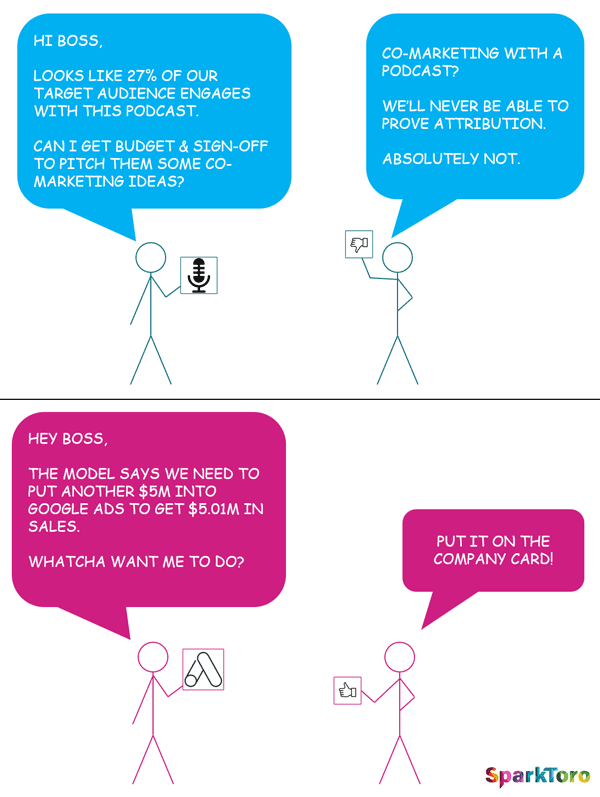
Executives Don’t Trust Us
I’m really bothered by how little trust there is between marketers and the more finance-oriented business functions. In particular, marketers seem to be at war with CEOs, CFOs, and CROs.
To try and figure out a way out of this seemingly hopeless conflict, I wrote a whole piece titled “How communication issues prevent you from getting buy-in for SEO”. In it, I learned that CFOs feel “disgust” for marketers, because they resent us for not knowing how to understand and plan our budgets.
And when trust is broken to the point of disgust… your work will get scrutinized. A lot.
But how can you actually explain your intuition? Many of us came into marketing because we are creative. We know what the right investments are in our gut, but we can’t fully explain how we know it. As I wrote in my piece:
“We often can’t point to our activities and correlate them to how much money came into our organization in a particular quarter. And because we aren’t able to clearly connect those dots for decision-makers, they might end up dismissing our work as not relevant to core business functions.”
I Messed Around and Found Out
It’s funny, I wrote that piece thinking I was so smart.
Look, everyone! I solved lack of executive buy-in with some communication tips. Now, let’s go get our budgets and get back to work.
As you might suspect, real life wasn’t so easy. In fact, shortly after publishing that piece, I had to deal with executive skepticism myself.
I was waiting for a deal to close. This was one of my literal dream clients, for an exciting test project that we’d accompany with a public case study. We were going to expand on the model I developed with SparkToro. And we were going to do it for a large B2B tech company.
Everything seemed perfect. Their content team was excited about working with me, a marketing executive approved the budget and timeline, their legal counsel approved the contract, HR and Finance cleared us in the vendor selection process, and I sent the contract for that one final signature.
A signature that never came.
Because in the last possible moment, three months after we first began negotiations, after we’d already done a kick-off call… one of their financial executives decided to pull the plug.
They didn’t see the reasoning to invest into a new marketing program. They didn’t believe in a higher ROI for fan-driven marketing. And they didn’t even give me a chance to argue my case.
I’ve… been struggling to recover from this. My self-esteem is still shattered, and I don’t know how long it will take me until I feel confident enough to get on another sales call.
This deal was so certain that I recorded a segment of a podcast appearance naming this company and excitedly sharing what we’d do. (I’ve had to message the podcast host with the most humiliating “can you please cut this section” request I’ve ever sent.)
And no, I couldn’t use crucial conversations to save this project. Because I wasn’t even allowed in the room.
Professional Insecurities Dig Up Personal Scars
I’d like to introduce you to an old friend of mine. Or, rather, it’s more of an awful cousin that you really hate but have to keep hanging out with because they’re family and get sat next to you at all the holidays.
This inescapable cousin is called “the dread”.
It’s a feeling described in a beautiful book I’ve been reading – “What My Bones Know” by Stephanie Foo. That book is the author’s memoir about healing from her childhood trauma and complex PTSD.
And, in Chapter 8, Foo describes something so familiar to me:
“Even though I was loved and loving, successful and happy <..> there were some…inconsistencies. It was mostly fine, really it was. Just, there were times when I got this feeling.”
“The dread arose when I was editing a tricky radio story, or I said something irritating at a party, <..> It seemed as if other people might be immune to moments like these; they somersaulted through their failures and ended up on their feet. But when I made a mistake, the dread crept into my field of vision and I couldn’t see anything except my mistake for an hour, maybe even a day.
Still, usually, these moments could be cured with a gulp of whiskey and a good night’s sleep. Then there was something larger—seemingly random hours or days or months when the dread swelled and became profound, like an enormous dark shadow lurking underneath me as I treaded water.”
I know the dread all too well. And I’ve been chocking in its black sludge for the past two weeks.
The moment I heard that the executive needed more justification to approve our budget, I felt the dread creeping up my spine.
As I headed to New York City for some conferences last week, I began having a panic attack.
As I woke up in the morning to go to the Marriott in Times Square for the first conference to support my friend Natalie, the dread made me snap at my husband Jack seconds after waking up.
I spent the day talking to literally every single person I wanted to spend time with. I met people I’ve admired from afar, like Ross Simmonds and Olga Andrienko, and they actually enjoyed talking to me and hearing my thoughts on marketing. I had someone call me “marketing royalty”.
I networked, laughed, and bonded with others. And yet, I went to bed that night feeling absolutely worthless and suffocated by self-hatred.
My brain pounded at me with every single mistake I made. It whispered every joke that I didn’t say correctly, every gesture that seemed clumsy, every word that came on too strong. And it convinced me that I was probably really annoying. That everyone who spoke to me did so out of pity. That nobody could ever actually want to speak with me.
As Foo points out, no amount of accomplishment is enough to kill the dread:
“Always, always: I tried to be good. But when the dread was at its most terrible, no matter what I did, I was never good enough. The great black dread started to ruin everything. I didn’t know how else to feed it—what it wanted from me.”
And no matter how much I feed this awful feeling, it never leaves me alone. Because when silence falls, my brain reminds me of how much I was neglected and abused growing up. And then, right when I can’t take it anymore, my brain adds “you were abused because you deserved it”.
Like Foo, I am haunted by past trauma and a childhood that taught me I wasn’t worthy of love. That I was bad. That I needed to suffer to earn happiness.
And no matter how many years pass or how much more suffering I experience, I can’t mask that fundamental belief that I’m worthless.
Foo understands that too:
“I thought I became a nice girl. I picked and picked at my memories, trying to figure out how, despite my best efforts, the horrible, rotten core at the center of myself managed to get past my defenses and worm its way out.”
You, reader, probably don’t have PTSD. (If you do, I applaud you for dealing with life as well as you have. I know it’s not easy.)
But even if you don’t suffer from complex, debilitating trauma – I suspect you’ve felt the dread before.
Especially when your work itself feels precarious and as the budgets you need to do your job keep getting ripped away from you.
Nothing activates fear quite like being told that you’re too stupid to understand your own specialty. And the game of marketing is currently rigged against us.
Working in Public, Feeling Worthless in Public
If you have any kind of public presence, you’ve probably experienced that strange chasm between how your life appears to others and how it feels to you.
I started writing this piece because I read a wonderful essay that one of my freelancers, Jeffrey Lupo, wrote about me. You can find his full piece here, but in the meantime, here’s the quote that broke my heart:
“There’s no denying it. People fall in love with Mariya and her writing because Mariya is here to connect with you via brute force emotional impact.”
It’s funny, and so kind. Yet whenever I read it, I feel the dread creeping up again. All because Jeffrey said “people fall in love with Mariya”. And my brain cannot process the idea that people might love me.
One of my first pieces for this newsletter was titled “Why Marketers Are Afraid of Kindness”. I published it on February 11, and I wrote about insecurity, impostor syndrome, and how difficult it is to accept kindness and compliments.
Hearing nice things about myself… breaks my brain. It simply doesn’t match my vision of reality.
So, as I wrote about back then:
“Any compliment towards me had to be flattery, fake politeness, or a mistake.
I deeply, sincerely believe that I do not deserve nice things. In my heart, I think that whenever someone is kind to me, they either want something or they are simply mistaken. Just give it enough time, and they will realize that they were wrong about me. Because sooner or later, I will disappoint everyone I meet.”
I’m not joking when I say that I’ve been waiting to disappoint all 330 of you who follow this newsletter and hundreds more of you that read it when I share links on social media.
So when my job literally includes me constantly putting myself out there, both with content and for networking, I feel a lot of dissonance.
I almost wish I got more hate comments. Because it’s so easy to believe others when they tell us we are worthless. So much easier than believing others when they tell us that they like our work. So much easier than believing that they might love us.
Photographic Evidence That Scares Me
I’ve spent a lot of time looking at my favorite pictures from last week.
During that trip to NYC, I visited two marketing conferences. On Monday, I supported friends and connected with so many like-minded marketers at Ascent. On Thursday and Friday, I attended HOTSAUCE where I led a workshop for 60+ professionals, filmed silly interviews, hung out with my husband and friends, and grabbed dinner with some of the loveliest people I’ve ever met.
Seriously, it was a fantastic week. Just look at all of the happiness and joy in these photos:
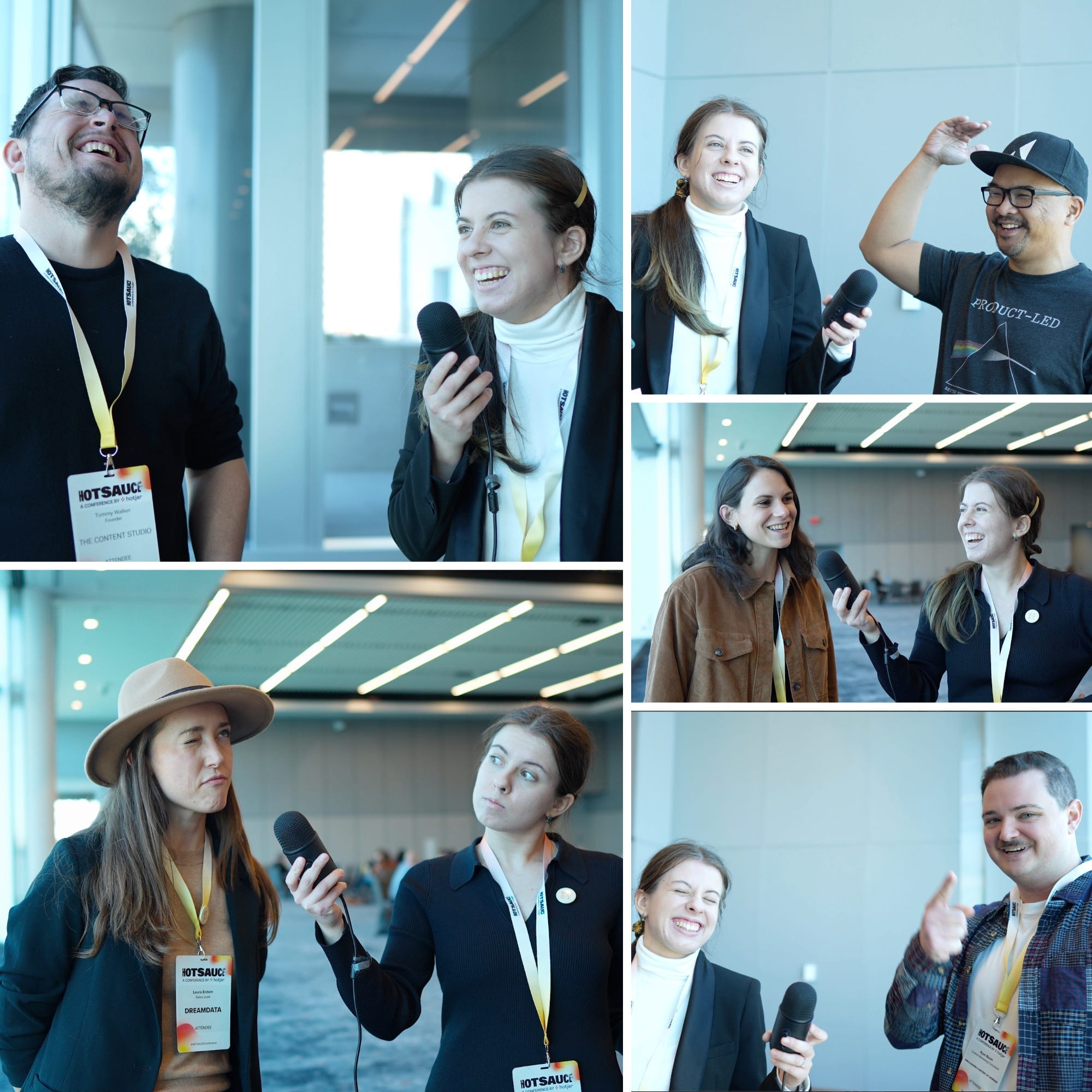
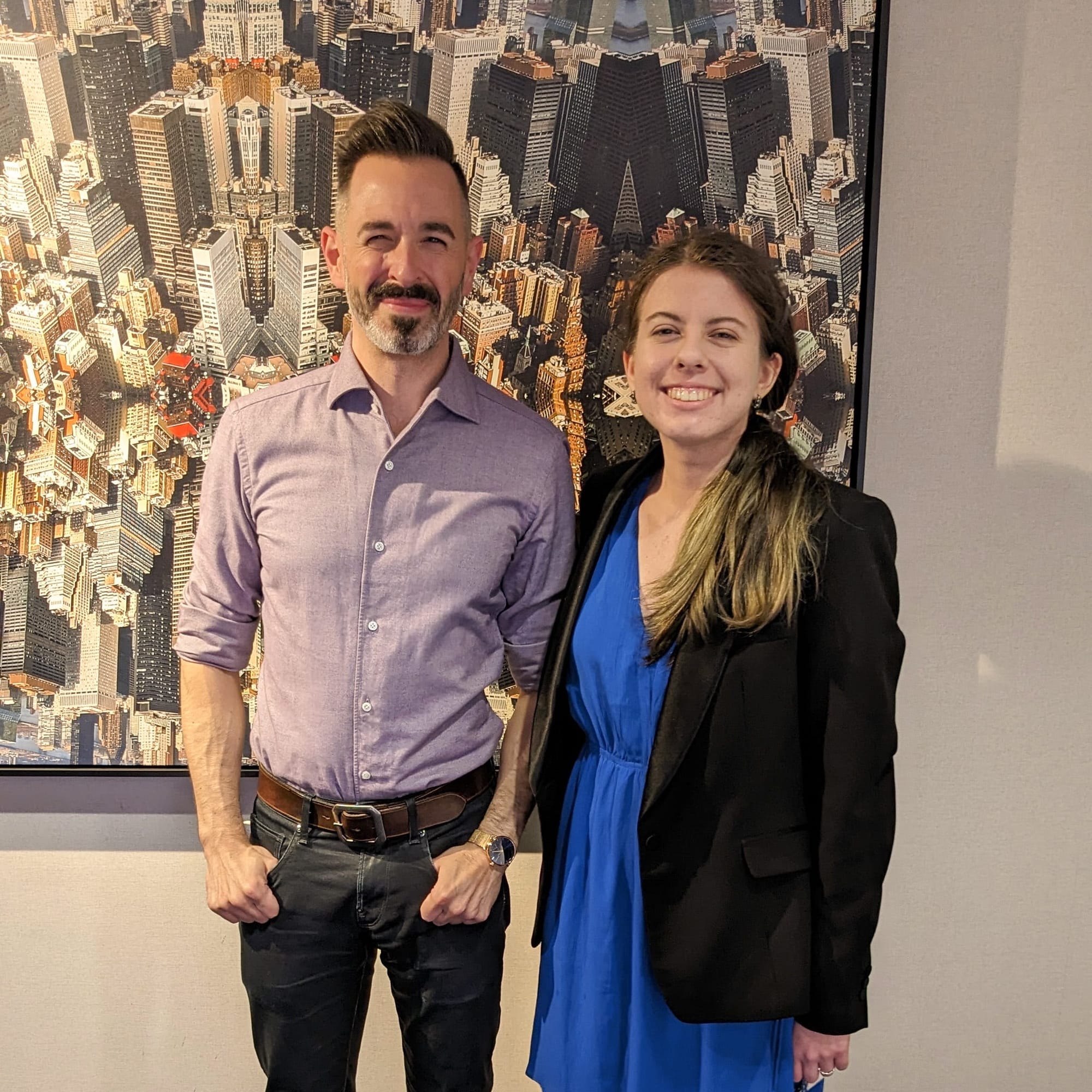
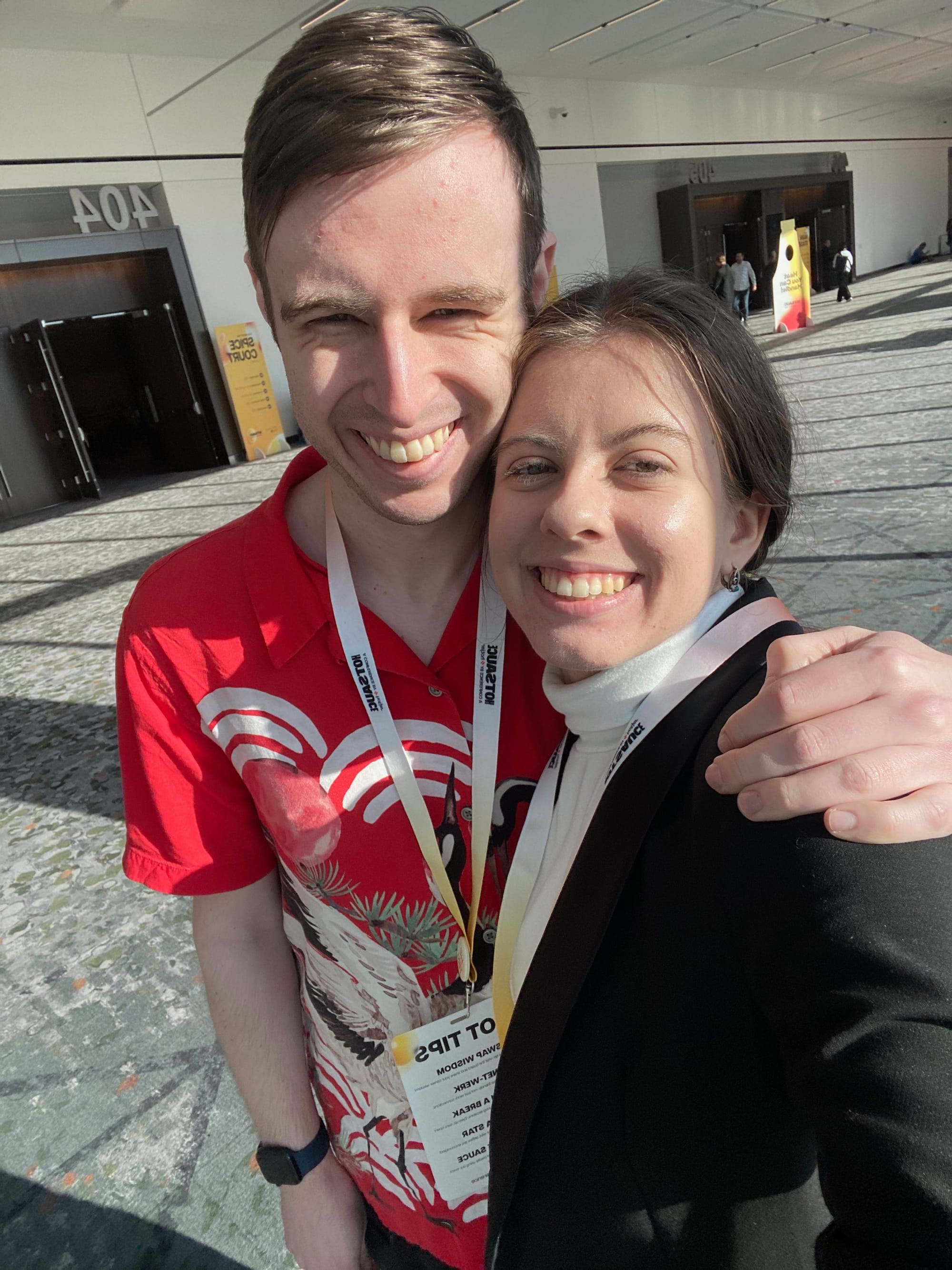
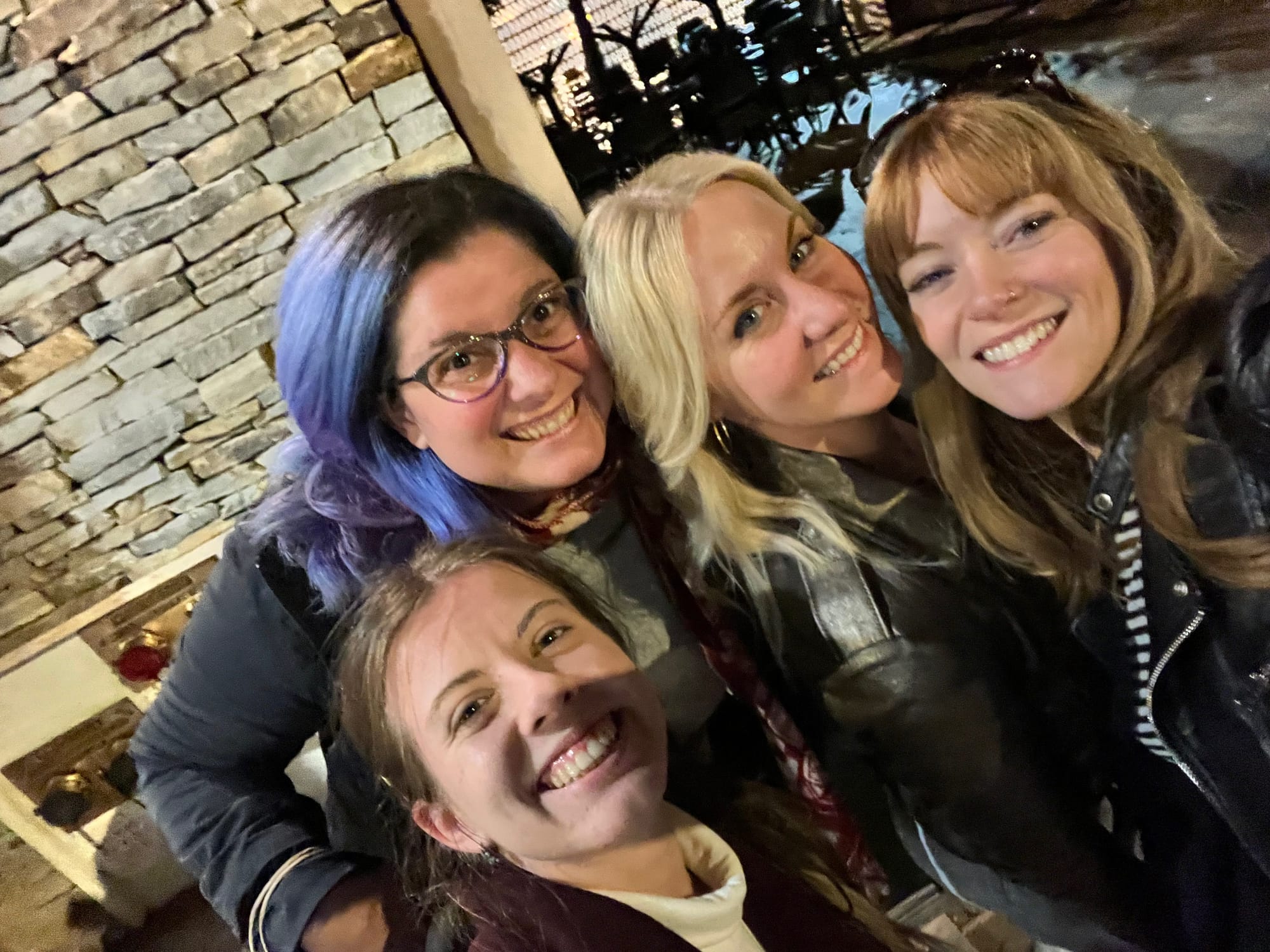
Some of my favorite photos from last week in NYC. People shown (from top left to bottom right): Tommy Walker, Ramli John, Natalie Marcotullio, Laura Erdem, Ryan Baum, Rand Fishkin, Jack Delano, Heather O'Neill, Claire Suellentrop, Georgiana Laudi.
I look at those pictures and think: I’m loved. I have a great life. I get to do the things I’ve dreamt of. I have a wonderful husband. I have fantastic friends. I make people in my network laugh and want to spend time with me.
So why did I return from NYC in tears? Why does my brain convince me that these photos aren’t real? And how do I convince myself to accept that other people might genuinely want to smile around me?
When A Writer Makes You Understand Yourself
I’m a bit scared to talk about one of my favorite writers.
This person is a phenomenal author: funny, intelligent, introspective. And their words have hit me to my very core so many times since I first began reading their work. When reading their writing I’ve sobbed, laughed, and squealed in delight.
But I’m scared to admit that because the reason I found their work is because I know their spouse. And that somehow makes it feel less real (or at least my brain tells me so).
However, I can’t write this piece without talking about this author.
So, here it goes (I’m already mortified): one of my favorite writers is Geraldine DeRuiter, the wife of Rand Fishkin.
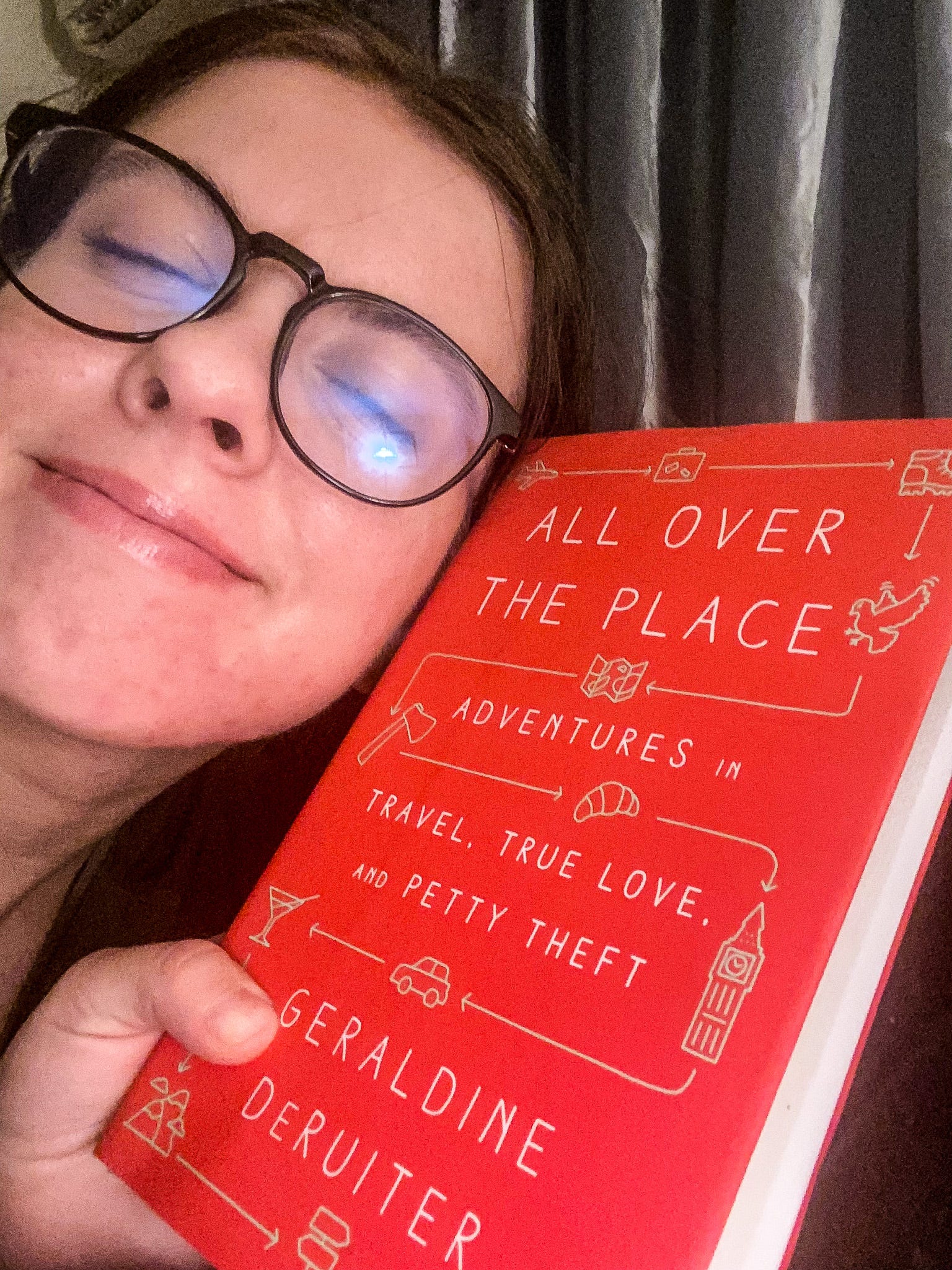
If you’ve read this piece, you’re aware that I know Rand. He’s in one of the photos above, where I’m smiling so wide you can’t see my eyes. So it’s very strange that I resonate so much with the work of his spouse, who I’ve never met or really interacted with.
But for some reason, Geraldine’s writing often speaks to my soul.
Without fail, whenever I’ve read anything from her blog, I’ve sat down to write something myself in a sudden burst of inspiration. When I listened to her book back in the spring, I nearly broke a plate because I was laughing so hard while washing the dishes.
And earlier this week, I felt something snap when I read her latest blog post.
Beauty, Hindsight, Self-Esteem
In it, Geraldine is looking at old photos that she took when taking a trip to Italy when she was 20. And she describes how much she didn’t like herself at the time:
“those moments in Italy, where I felt, for one of the first times in my life, truly awful about myself. The way it permeated all through me. That somehow being unlovable meant I wasn’t pretty, and vice-versa.”
And then she compares the way she felt then to how she feels now, decades later, looking at those same pictures:
“I look at them now, and am stunned by how beautiful I am.”
I read Geraldine’s blog post and thought: it’s easy for her to say that she was beautiful in those pictures. Obviously, I can see how beautiful the woman in those pictures really was (and is!).
But then, in the same breath, I turn to look at myself and wonder how I could be so ugly.
I felt as if the dread was caught in bright daylight when reading Geraldine’s conclusion:
“My life is wonderful. And honestly more than I could have hoped for as an insecure 20-year-old who dreamed of becoming a writer, who so desperately wanted someone to love her for who she was. And it is okay to say these things. It really is. We are allowed to love ourselves and our lives. What else are we supposed to do with our limited time here? The clock is counting down. The last twenty two years passed by in a blink. Listen to me: enjoy every minute. Do not spend time hating yourself.”
I read Geraldine’s post moments after closing a Google search looking up “how do I stop hating myself”. Her reflections felt like a gut punch.
But she’s right. Hindsight really does make things so clear.
When I look at my own old pictures, I wonder how I could have looked so pretty despite all the pain I carried. Those were the years directly after my worst trauma. I managed to get good grades, fall in love, and make friends while my brain was desperately screaming for safety from abuse. I was so freaking strong.
I was strong and beautiful. And yet, I didn’t see it.
For example, I took this picture in high school, the day after my junior prom. And then, not even two hours later – I went to chop off all of my hair because I thought I was hideous.

Jumping ahead (and to make a poetic comparison to Geraldine’s post), here’s my own photo that I took during a college trip to Italy, when I was 18:

I was heartbroken. I took that photo to try and impress a boy who I thought was too beautiful to even look at me. It took me an hour of standing in the cold and posing to find a shot I didn’t despise.
Even still, I didn’t want to zoom in. Whenever I looked at it too closely, all I could see in that photo was my disgusting, Slavic nose. I hated how much my nose gave away that I was Ukrainian.
I had been planning to get a nose job since I was 15. To erase any markers of my identity and my past. I only started to like my nose in February of 2022, when my country got threatened and my Ukrainian identity became a point of pride.
And now, when I look at either of those photos I see a girl who was so pretty. And who still had so much light in her eyes, not extinguished by the horrors thrust upon her.
I see the young woman who would, less than a decade later, be invited to present at conferences and have her work followed by thousands of people.
Healing from the Dread
I really want to remember the final words of Geraldine’s post:
“And when this forced perspective does not work, and I still feel ugly and unlovable, I just remind myself: I’ve been wrong before.”
I want to etch those words into my heart. Because when the dread creeps up on me again and tells me I’m worthless, stupid, and ugly – I want to remember that I’ve been wrong before.
I want to remember that other people do love me. And that other people value my intelligence, my work, and my personality. That other people can find me beautiful, inside and out.
And I want you, reader, to remember that too.
Even if your job feels impossibly hard. Even if demons of your past taunt you telling you that you deserve to be laid off or berated. Even if you feel the dread chocking you late at night.
You’re not worthless. I’m not worthless. Marketing isn’t worthless.
We deserve love. We deserve hope. We deserve to believe in ourselves.
Musical Minute
LP - Muddy Waters.
“Is it only when you feel a part is empty
That it’s gnawing at the corners of your mind
I will ask you for mercy
I will come to you blind
What you’ll see is the worst me
Not the last of my kind”
This song feels like it’s about the dread. LP’s voice is also so hauntingly beautiful.
Top 3 Reading Recommendations
- “Hindsight is the Best Filter” by Geraldine DeRuiter. Seriously, read this. I hope this newsletter convinced you enough!
- “The Great Social Media–News Collapse” by Charlie Warzel. The effect of social media on news and journalism has been… pretty complicated. This piece explains some of the harm that broken incentives have caused.
- “Belonging and community” by Ben Werdmuller. A lovely piece about community, nationality, and the IndieWeb movement.
Thank you for reading Attention Deficit Marketing Disorder. This post is public so feel free to share it.



